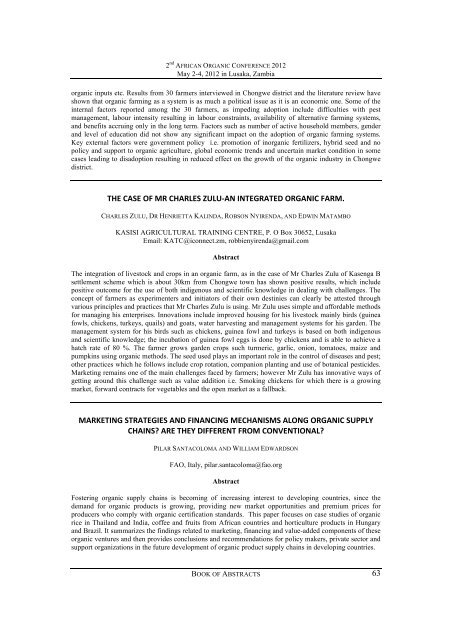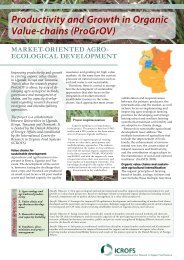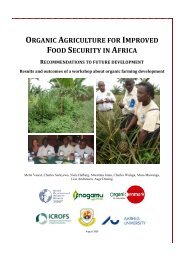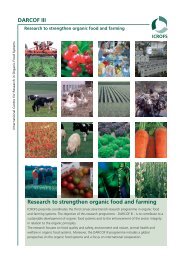The 2nd African Organic Conference â Mainstreaming ... - ICROFS
The 2nd African Organic Conference â Mainstreaming ... - ICROFS
The 2nd African Organic Conference â Mainstreaming ... - ICROFS
You also want an ePaper? Increase the reach of your titles
YUMPU automatically turns print PDFs into web optimized ePapers that Google loves.
2 nd AFRICAN ORGANIC CONFERENCE 2012<br />
May 2-4, 2012 in Lusaka, Zambia<br />
organic inputs etc. Results from 30 farmers interviewed in Chongwe district and the literature review have<br />
shown that organic farming as a system is as much a political issue as it is an economic one. Some of the<br />
internal factors reported among the 30 farmers, as impeding adoption include difficulties with pest<br />
management, labour intensity resulting in labour constraints, availability of alternative farming systems,<br />
and benefits accruing only in the long term. Factors such as number of active household members, gender<br />
and level of education did not show any significant impact on the adoption of organic farming systems.<br />
Key external factors were government policy i.e. promotion of inorganic fertilizers, hybrid seed and no<br />
policy and support to organic agriculture, global economic trends and uncertain market condition in some<br />
cases leading to disadoption resulting in reduced effect on the growth of the organic industry in Chongwe<br />
district.<br />
THE&CASE&OF&MR&CHARLES&ZULU:AN&INTEGRATED&ORGANIC&FARM.&<br />
CHARLES ZULU, DR HENRIETTA KALINDA, ROBSON NYIRENDA, AND EDWIN MATAMBO<br />
KASISI AGRICULTURAL TRAINING CENTRE, P. O Box 30652, Lusaka<br />
Email: KATC@iconnect.zm, robbienyirenda@gmail.com<br />
Abstract<br />
<strong>The</strong> integration of livestock and crops in an organic farm, as in the case of Mr Charles Zulu of Kasenga B<br />
settlement scheme which is about 30km from Chongwe town has shown positive results, which include<br />
positive outcome for the use of both indigenous and scientific knowledge in dealing with challenges. <strong>The</strong><br />
concept of farmers as experimenters and initiators of their own destinies can clearly be attested through<br />
various principles and practices that Mr Charles Zulu is using. Mr Zulu uses simple and affordable methods<br />
for managing his enterprises. Innovations include improved housing for his livestock mainly birds (guinea<br />
fowls, chickens, turkeys, quails) and goats, water harvesting and management systems for his garden. <strong>The</strong><br />
management system for his birds such as chickens, guinea fowl and turkeys is based on both indigenous<br />
and scientific knowledge; the incubation of guinea fowl eggs is done by chickens and is able to achieve a<br />
hatch rate of 80 %. <strong>The</strong> farmer grows garden crops such turmeric, garlic, onion, tomatoes, maize and<br />
pumpkins using organic methods. <strong>The</strong> seed used plays an important role in the control of diseases and pest;<br />
other practices which he follows include crop rotation, companion planting and use of botanical pesticides.<br />
Marketing remains one of the main challenges faced by farmers; however Mr Zulu has innovative ways of<br />
getting around this challenge such as value addition i.e. Smoking chickens for which there is a growing<br />
market, forward contracts for vegetables and the open market as a fallback.<br />
MARKETING&STRATEGIES&AND&FINANCING&MECHANISMS&ALONG&ORGANIC&SUPPLY&<br />
CHAINS?&ARE&THEY&DIFFERENT&FROM&CONVENTIONAL?&<br />
PILAR SANTACOLOMA AND WILLIAM EDWARDSON<br />
FAO, Italy, pilar.santacoloma@fao.org<br />
Abstract<br />
Fostering organic supply chains is becoming of increasing interest to developing countries, since the<br />
demand for organic products is growing, providing new market opportunities and premium prices for<br />
producers who comply with organic certification standards. This paper focuses on case studies of organic<br />
rice in Thailand and India, coffee and fruits from <strong>African</strong> countries and horticulture products in Hungary<br />
and Brazil. It summarizes the findings related to marketing, financing and value-added components of these<br />
organic ventures and then provides conclusions and recommendations for policy makers, private sector and<br />
support organizations in the future development of organic product supply chains in developing countries.<br />
BOOK OF ABSTRACTS 63





